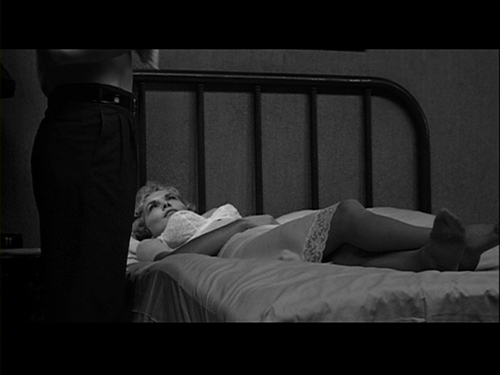Through the Looking Glass
- Swapping Loyalties
- Mirrors
Committing Crime and Exacting Punishment
- Rear Window
- Vertigo
- Psycho
Bombarding the Bombshell
Conclusion
References
Self-destruction through Self-satisfaction: how Psycho’s masturbatory indulgence kills the Hitchcock-ian blonde.
…incomparably more exciting than the openly provocative brunette is the cold blonde who, as Hitchcock reminds us, knows how to do many things once we find ourselves alone with her in the back seat of a taxi. (Žižek 124).
Žižek says that the blonde is more exciting than the openly provocative brunette. I am willing to run with this analysis and claim that Hitchcock is steadily worsening punishments for his blonde as an unintentional (yet no less relevant) way of righting his own wrong. The claim is that Hitchcock had overly sexualized his cherished-yet-unattainable dolls to the audiences, thus killing the mystery of their sexuality.
When the viewer wonders, “Why the hell would Grace Kelley fall for Jimmy Stewart?” an element of uncertainty, of enigma is added to the symbol. The gaze-driven male asks himself, “What draws these beauties into the arms of flawed beasts?” With Psycho, the viewer knows why the lovers unite: their connection is facilitated by what Hollywood once could not show: sex. The first 10 minutes of footage immediately saturates us in the reality of Marion and Sam’s sexcapades, and in doing so, the enigma, the taboo, completely evaporates.

The question of whether Marion is sexually pure has been answered, leaving one less question for the viewers carnal id to answer. In moving closer to metaphysically possessing the object he desired the most and to consummating his obsessions, Hitchcock’s mechanical eye beheld and simultaneously unraveled the enticed shroud his viewers had also been kept in. We as the audience are now those who know too much, and the only possible result of gaining such knowledge is our own destruction, our sudden “enlightenment is not a liberation; having to know the truth is accursed” (Allen 55). This, however, is physically (even metaphysically) impossible ; we cannot die from watching a movie. The audience is thrown into yet another metafictional situation where the overlap is between our own lives and the rules Hitchcock’s films have created concerning which characters live and die: even when looking solely at the rules our auteur’s films have laid, the only solution is destruction. The man who knows too much is the persecuted and the pursued; when he cannot or will not die the attacker will in his stead. The assailant is always the element exposing that final bit of knowledge, in Psycho: Marion Crane. Drawing from the second The Man Who Knew Too Much, when Marion’s body is exposed to the invisible eye, she becomes the leak, the Frenchman. Norman’s knife will not penetrate the screen to punish the audience, but it will penetrate Marion instead. The concept rings of tragedy: that our greatest desire is the thing we’d destroy if we beheld.